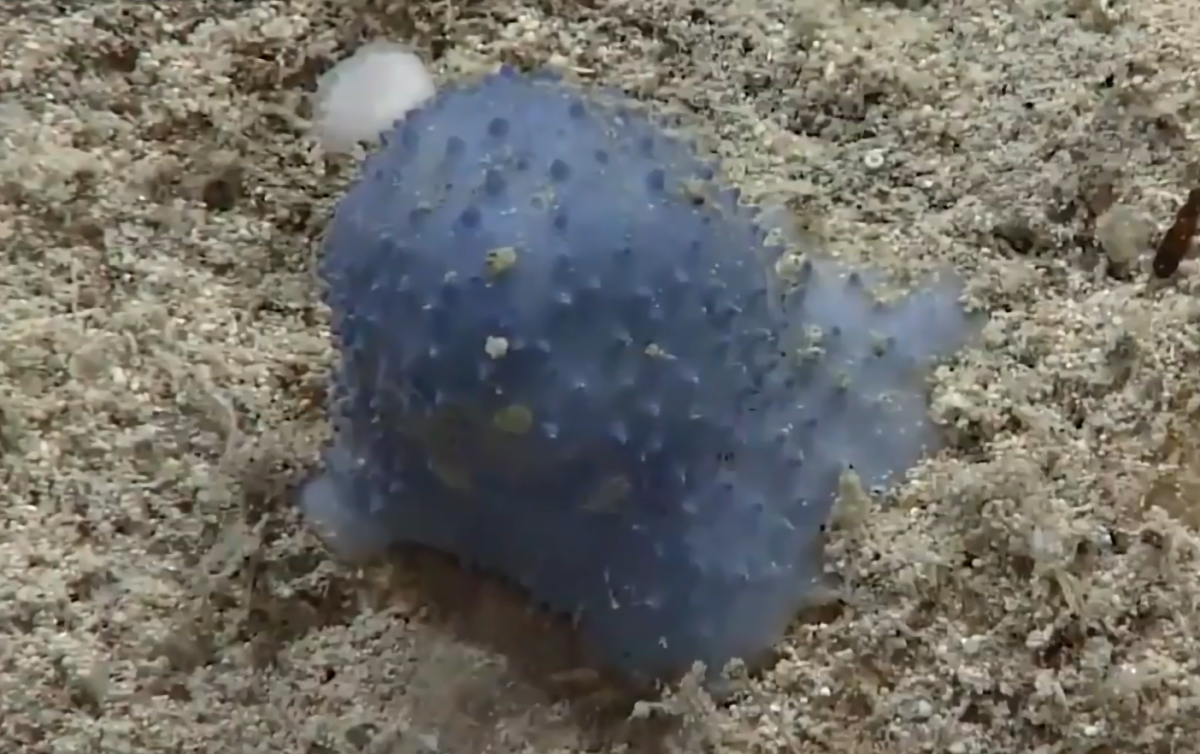A strange, blue, alien-looking goo creature has been filmed on the Caribbean ocean floor, stumping scientists.
Filmed on August 30 in the waters off St. Croix near Puerto Rico, at depths of around 1,400 feet, the National Oceanic and Atmospheric Administration (NOAA) Ocean Exploration researchers observing couldn't figure out what it could possibly be, other than that it was some sort of animal.
"It's a possibility that it [is a soft coral]," one of the researchers can be heard saying in the video. "We're still not sure."
The bizarre blob was discovered during an NOAA Ocean Exploration expedition called the Voyage to the Ridge 2022 expedition, which was intended to collect a variety of data, including acoustic data of seafloor and the geomorphology of the seafloor and below.

NOAA hopes the data will improve our understanding of the Atlantic Ocean's geology, and how human actions are affecting populations of deep-sea species.
As well as soft coral, other suggestions put forward were the blue goo being a tunicate, or possibly a sponge.
"It's not quite gooish, but doesn't seem particularly not gooish," one scientist said in the video.
The Caribbean Sea, where the mysterious blue blob was found, has the highest level of biodiversity of any other area in the Atlantic, teeming with life ranging from invertebrates like sponges and corals to large vertebrates, such as sharks and rays.
However, according to a report from the Organization of Eastern Caribbean States, this biodiversity is at risk, mostly due to human actions in the area.
Overfishing is affecting populations of pelagic finfish, reef fishes, crustaceans, and molluscs, due to them not being harvested sustainably, under fishing pressure. Often, these species are too slow growing and have too few young to replace themselves at the same rate that they are being fished, leading to decimated populations.
Additionally, marine habitat destruction is preventing a lot of bottom-dwelling species from thriving: trawling disturbs the seabed, re-suspending sediments; coastal development causes erosion and sedimentation, also reducing water transparency and stressing corals and marine plants.
Pollution including sewage, oil, pesticides, marine debris, and toxic substances entering the oceans can result in the uncontrollable growth of algae, leading to lower oxygen levels in the water.
Encroaching climate change will only exacerbate these problems, as well as adding more issues from rising sea levels and increased water temperatures leading to coral bleaching.
According to NOAA, the North Atlantic, which includes the Caribbean Sea, is essential to a range of human needs, including food security, protection from hazards, trade, tourism and recreation.
For now, the blue goo is yet to be positively identified.
"The mystery will remain until a sample can be collected, or until we can send some of these images, which are really high-quality, to some coral expert and see if those could indeed by some sort of coral," said one of the scientists.
Uncommon Knowledge
Newsweek is committed to challenging conventional wisdom and finding connections in the search for common ground.
Newsweek is committed to challenging conventional wisdom and finding connections in the search for common ground.
About the writer
Jess Thomson is a Newsweek Science Reporter based in London UK. Her focus is reporting on science, technology and healthcare. ... Read more





